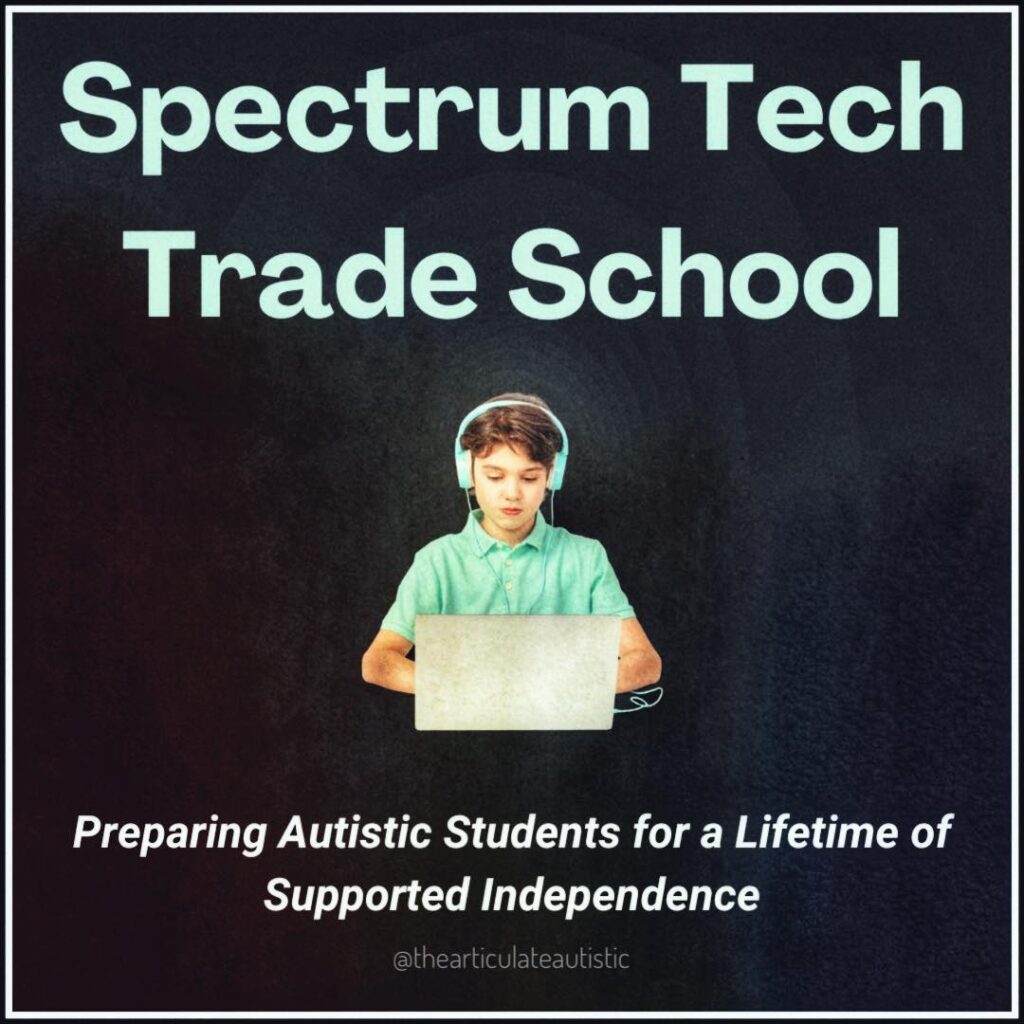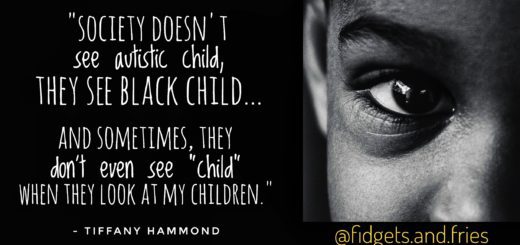Spectrum Tech Trade School – An Emerging Non-Profit That Prepares Autistic Students for a Lifetime of Supported Independence

What if there was a real and tangible alternative to damaging ABA and IEPs that don’t effectively accommodate autistic students? Would you want to know more about it? Would you support it? In this interview, I speak with Lisa Sosnowski, the founder and CEO of Spectrum Tech Trade School, a school that prepares autistic students for a lifetime of supported independence.
What first made you aware of how the traditional approach to schooling wasn’t working for your autistic son?
When my son, Stephen, was just five years old and spoke only a few words, we decided to purchase him an iPad and many flashcard apps to go with it. I felt if he wasn’t speaking yet, we could at least help him understand what was being said to him. He loved those apps, and some of them had very advanced words. One day, to show me he wanted to go to his favorite park, Turkey Swamp Park in Jackson, New Jersey, he showed me a picture of the flag of the country of Turkey and a picture of a swamp.
There is this incorrect assumption that speaking ability is equal to cognitive ability, which is not the case, especially for neurodivergent individuals.
I knew at that moment that my son had so much potential. For a child of his age to figure out so ingeniously how to communicate what he wanted, I knew he was being underestimated by all those professionals working with him. I began trying to convince his team that they needed to capitalize on his love of language. That was pretty much ignored. There is this incorrect assumption that speaking ability is equal to cognitive ability, which is not the case, especially for neurodivergent individuals. If someone had a hearing impairment, we would not assume they did not have the cognitive ability to learn certain subjects or to do certain things, but once you put the word autism out there, logic is no longer applied.
Eventually getting out of the district was the only option due to an atrocious behavioral plan that the district put together (to find out more on this listen to my interview on the High School Hamster Wheel Podcast on our website). Getting into an out-of-district private school did not solve the problem of Stephen not being given opportunities to work on his strengths. I told the new team at the new school about how he requested to go to Turkey Swamp, it made a great story for their donors, but they did not do anything to advance my son’s vocabulary. I knew then I had to do the research on my own and work with him at home instead of relying on the school system.
Can you explain how applied behavioral analysis (ABA) causes trauma to autistic students?
ABA is based on compliance, obedience, and control. It makes assumptions that behaviors are motivated, under the control of the student, and goal-oriented. Most times, this is not the case with autistic students, instead behaviors we see are primal reactions of the subconscious survival brain governed by the nervous system. This nervous system activation is due to differences in perception. These factors are not considered, and behaviors are seen as something to extinguish either by ignoring, providing a reward for a preferred behavior, or using a form of punishment. If this happens continually, a person develops chronic and sometimes complex trauma because their needs are not being met, and they are continuously being told to ignore body signals of pain and discomfort.

Photo Credit @ Stephen Sosnowski
When feeling unsafe, unseen, misunderstood, and continuously being subjected to painful stimuli (and helpless to change a situation because attempts to communicate are being ignored or punished), a child develops an insecure attachment with the adults in their life. Attachment should provide a child with a sense of safety, trust, and security to enable them to explore their environment, develop a sense of self, and learn. It is only when adults are sensitive and responsive to a child’s needs consistently that a secure attachment forms.
Secure attachment provides the building blocks for children to develop trust, emotional regulation, social skills, and cognitive abilities. By this same principle, trauma can impact a child’s cognitive development, emotional health and regulation skills, mental health, and relationships.
Children are especially susceptible to external influences because the emotional processing part of their brain is experience-dependent. When trauma occurs during this crucial development stage of the brain, it can have a lasting detrimental impact. It can even change the child’s brain, making them more susceptible to trauma and decreasing the logical thinking part of the brain. What is the purpose of school if a child does not feel safe to explore and learn?
We know that the foundation of ABA is not relationship-based and therefore ignores attachment altogether. By ignoring this crucial piece in development, and instead using a compliance-at-all-costs model, ABA is, in essence, creating trauma. This is backed up with data from recent studies on autism and PTSD. We know from these studies that sixty percent of autistics have experienced PTSD-like symptoms. There also is an overlap between these symptoms and autistic traits.
So, what are autistic traits, and what is autistic trauma?
Since trauma impacts so many important areas of the brain and is an important factor in determining outcomes, we should be doing a better job at trauma-informed education. At Spectrum Tech, we have individuals on the Board of Directors, including myself, who have taken classes on trauma and somatic practices, and we are incorporating them into our proprietary methodology.
Explain Spectrum Tech Trade School and what it offers. What was the impetus for its development?
Spectrum Tech Trade School offers an immersive, experiential, interconnected, dynamic learning program based on a student’s strengths and interests, with wrap-around co-treating intensive therapeutic supports in a tranquil, trauma-informed environment. Our mission is to instill a love of learning in an empowering and supportive setting, using brain-based science to create optimum conditions for the neurodivergent brain to learn, thus giving the student the best chance to reach their full potential.

Photo Credit @ Stephen Sosnowski
My son was horribly traumatized in both public and private settings. Seeing him suffer was the hardest part of this journey with him. After endless nights of research (which included listening to what autistic adults have been saying), visiting different schools in the area, and feeling desperate to help him find a safe place to go to school, I finally started to come up with a ‘vision board’ of what I wanted a school for autistic students to look like.
Spectrum Tech Trade School offers an immersive, experiential, interconnected, dynamic learning program based on a student’s strengths and interests, with wrap-around co-treating intensive therapeutic supports in a tranquil, trauma-informed environment.
I happened to open up about this idea during one of my son’s sessions with Jackie Hines, Vice President of our Board of Directors, and a Clinical Doctor of Physical Therapy. I am happy to say that she loved the idea. To be honest, I wasn’t getting much support for my idea in my inner circle, most people thought it was a good idea but way too big to tackle. I told Jackie that if she agreed to join the board I would form the nonprofit, and that is how Spectrum Tech Trade School came to be.
We are both go big or go home type people, so we work well together.
I bring the business and caregiver perspective, while she brings many years of clinical experience with autistic clients using trauma-informed practices. We built the board out from there, and I am grateful for every one of our members and their belief in and dedication to our vision. It is true, all you need is one person to believe in you to give you the courage to take that leap. I want to give that feeling to autistic students at Spectrum Tech. I want them to know that we believe in them and their potential.
What does Spectrum Tech Trade School offer neurodivergent students that public and private schools do not?
The bottom line is that Spectrum Tech offers neurodivergent students choices that other facilities do not. We work with student strengths and interests that are often ignored in other settings because they are focused on deficit-based education. We get down to the granular level and really drill down on what skills a person would need to perform a particular job.

Photo Credit @ Stephen Sosnowski
Most public and private schools only have a basic two-path approach:
The first path is for neurodivergent students who can keep up academically and are able to attend a degree program in college. The student doesn’t get presented with other choices such as trade schools or apprenticeship programs that may be a better fit for them. The independent learning, large size of the classrooms, and executive functioning skills required in a college setting are often shocking and challenging for any student. Many times, neurodivergent students struggle in a college setting with additional social pressures, or with being pushed towards certain career paths such as technology, which not all neurodivergent students excel in.
The second path is for neurodivergent students who would not be at grade level academically, therefore; they would not be able to obtain a degree in college (although there are plenty of colleges that charge for ‘certificate’ programs). This encompasses students with many different challenges, those with intense sensory integration, sensory sensitivities, or sensory perception challenges (often used interchangeably but very different), those with language challenges, which is an area that has an incredibly large scope, those with executive functioning difficulties, and there are also those with motor challenges.
Most schools do not have the knowledge or capability to address these varied therapeutic needs, so the students make very little progress.
They are given limited academic exposure, and, most often, they are put in retail or other public-facing jobs, which, especially for students with complex needs, is not a good fit at all.
They are given limited academic exposure, and, most often, they are put in retail or other public-facing jobs, which, especially for students with complex needs, is not a good fit at all. Dealing with the public can be anxiety-inducing and unpredictable. These students are essentially set up for failure. When the job coaches leave, often the person cannot perform the job on their own, and we wind up with the rate of ninety percent of autistic adults being unemployed or underemployed.

Photo of Stephen Sosnowki as Photographer
This is not only a lack of accommodations by the employer, but also incorrect placement, lack of marketable skills, lack of proper support, and ignoring of autistic strengths that are causing these horrible employment statistics. Spectrum Tech Trade School is here to take on the system and be the change. Evidence of our program and what we can do for neurodivergent students can be seen on a small scale with my own son.
Working with the therapists on the Board of Directors, we developed his talent by utilizing his special interest in taking pictures of his beloved Thomas the Tank Engine trains and turned it into a possible career pathway.
You can see his photos on our Instagram account @spectrumtechtradeschool. He has even been featured in the August 2023 issue of Re-Route Magazine, a magazine that features autistic artists.
How does Spectrum Tech Trade School prepare neurodivergent students for adult independence? How does that differ from the approach of public schools and private facilities?
Spectrum Tech Trade School prepares students for a lifetime of supported independence. Our business model is comprised of interconnected properties and varied experiences that provide autistic individuals with educational opportunities and support throughout their lives. Our foundation of learning starts with secure and safe relationships (including peer mentoring programs), a focus on autonomy, and providing strength-based education so that a person is successful. This builds upon itself and creates self-confidence and self-esteem which encourages expansion of horizons.
There is no “aging out” because our plan includes adult employment and consulting opportunities, housing, recreation, and other supports.
Spectrum Tech Trade School prepares students for a lifetime of supported independence.
It is unfortunate, but public and private facilities follow the Individualized Education Program (I.E.P) and don’t usually go above and beyond that. Most of these are written as deficit-based goals and usually lack a plan for true generalization of skills, and what most programs view as generalization is just rote memorization.
Let’s not forget the incredibly important skill of regulation. These plans almost never include a scaffolded plan for emotional and sensory regulation skills. Life is unpredictable, and a person needs to be able to adapt and regulate in different situations.
Once students age out and become adults, it becomes the problem of the individual and their families to prepare for an independent life if they were ill-prepared in a school setting. Limited budgets and adult programs that are overcrowded leave the individual without much support or options.

Photo Credit @ Stephen Sosnowski
We encourage everyone to embrace this time of change, to join the movement, as a community. W.E. R.I.S.E – Working together, Educating, Revolutionizing, Inspiring, Supporting, Empowering. Spectrum Tech Trade School, Village, and Training Center is The Future of Autism Education and Job Training Across the Lifespan. Contact me at lisa@spectrumtechtradeschool.com for more information, to donate, or to join our team.
Thank you, Jaime, for believing in our vision and helping to get the word out about Spectrum Tech Trade School, we very much appreciate this opportunity. Furthermore, welcome to our Board of Directors!
About Lisa

Businesswoman, Autism Advocate, Mom, Researcher
Lisa received her accounting degree from Rutgers. She has over 17 years of corporate accounting experience including Accounting and Human Resource Manager for Polmar Technologies a Computerland Franchise, Regional Accounting Manager for Covanta Energy where she led multidisciplinary teams at 13 of their energy from waste plants across the country and HQ staff in month end closings, consolidations, and SEC reporting, and for the start-up Miro Consulting creating and leading the Oracle License Audit Department.
Her entire life changed in 2008 when her son was diagnosed with Autism, since then she has dedicated her life to helping him reach his full potential, which included many hours of reading hundreds of books and articles and taking 100 plus courses on various subjects pertaining to autism, researching the latest studies, and listening to autistic adults. She has volunteered at a parent mentor for SPAN NJ and is a member of the Monmouth County Children’s Inter-Agency Coordinating Councils (C.I.A.C.C.) and their Intellectual and Developmental Disabilities, and Equity, Diversity, and Inclusion Committees. Through her investigation into the Autism Services System, and her own son’s traumatic experiences in that system, she identified many gaps that prevent the progress of autistics.
Statistics prove that current programs are failing -90% of autistic adults are unemployed or underemployed, and 50% of 25-year-olds have never held a paying job. Harmful labels and the refusal of the Autism Services System to accept that the Spectrum is circular and not linear, limits the ability for autistics to thrive and focuses more on compliance and “fitting in” instead of revamping the system so they can stand out and achieve positive outcomes. She founded the start-up nonprofit Spectrum Tech Trade School, Village, and Training Center, a trauma-informed, motor-sensory-language, strength-based, experiential empowerment learning ecosystem for autistics age 12 through adult, that is poised to become the Future of Autism Education and Job Training Across the Lifespan.
She hopes to take this model worldwide. In her spare time, she enjoys hiking, painting, writing poetry, photography, culinary pursuits, and reading fantasy and horror novels.



